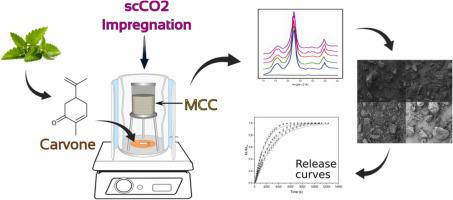The Journal of Supercritical Fluids ( IF 3.9 ) Pub Date : 2022-06-20 , DOI: 10.1016/j.supflu.2022.105671 Noelia D. Machado , José E. Mosquera , Raquel E. Martini , María L. Goñi , Nicolás A. Gañán

|
In this work, the supercritical CO2-assisted impregnation of microcrystalline cellulose (MCC) particles with R-(−)-carvone, an antimicrobial monoterpene, was investigated. The effect of CO2 density (278–600 kg m−3), temperature (40–60 °C), carvone:MCC mass ratio (0.5–1.0), and depressurization mode (cold–hot), on the impregnation yield was studied. Carvone loadings were obtained in the range of 0.6–3.6 wt%, and the addition of ethanol (2 wt%) as cosolvent enhanced the impregnation yield up to 10 wt%. The high crystallinity of cellulose (81–84%) remained unchanged after the supercritical process, although SEM analysis showed a partial separation of fiber agglomerates. Carvone release in simulated saliva solution from particles impregnated using cosolvent was slightly slower than from the pure CO2-impregnated particles. The observed release profile could be useful for pharmaceutical and biomedical applications, such as the prevention of oral cavity infections or their treatment at early stages.
中文翻译:

用 R-香芹酮超临界 CO2 辅助浸渍纤维素微粒:工艺变量对浸渍产率的影响
在这项工作中,研究了超临界 CO 2辅助浸渍具有抗菌单萜的R -(-)-香芹酮的微晶纤维素 (MCC) 颗粒。CO 2密度的影响(278–600 kg m -3)、温度(40-60°C)、香芹酮:MCC质量比(0.5-1.0)和减压模式(冷-热)对浸渍产率的影响进行了研究。香芹酮负载量在 0.6-3.6 wt% 范围内,添加乙醇(2 wt%)作为助溶剂将浸渍产率提高到 10 wt%。超临界过程后纤维素的高结晶度(81-84%)保持不变,尽管 SEM 分析显示纤维团块部分分离。使用助溶剂浸渍的颗粒在模拟唾液溶液中的香芹酮释放比纯CO 2浸渍的颗粒稍慢。观察到的释放曲线可用于药物和生物医学应用,例如预防口腔感染或早期治疗。


























 京公网安备 11010802027423号
京公网安备 11010802027423号